外研版(2019)必修第一册Unit 5 Into the wild Using language Grammar 课件(31张PPT)
文档属性
| 名称 | 外研版(2019)必修第一册Unit 5 Into the wild Using language Grammar 课件(31张PPT) | 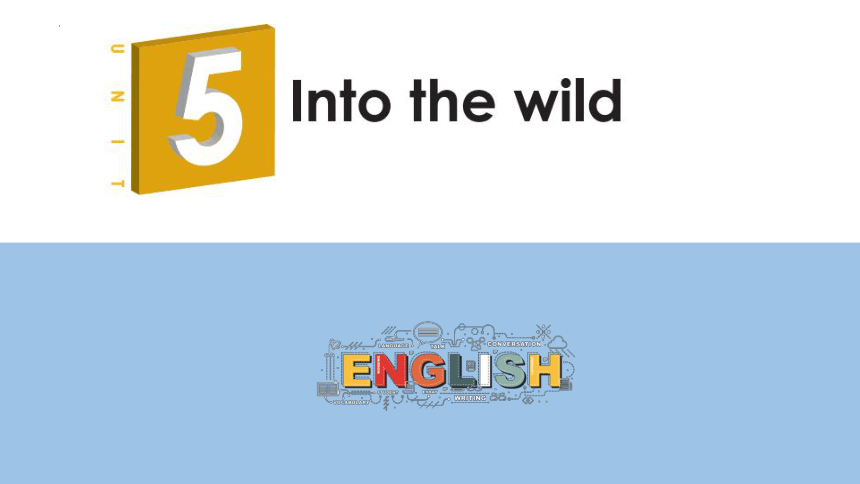 | |
| 格式 | pptx | ||
| 文件大小 | 755.4KB | ||
| 资源类型 | 教案 | ||
| 版本资源 | 外研版(2019) | ||
| 科目 | 英语 | ||
| 更新时间 | 2022-12-01 21:46:55 | ||
图片预览

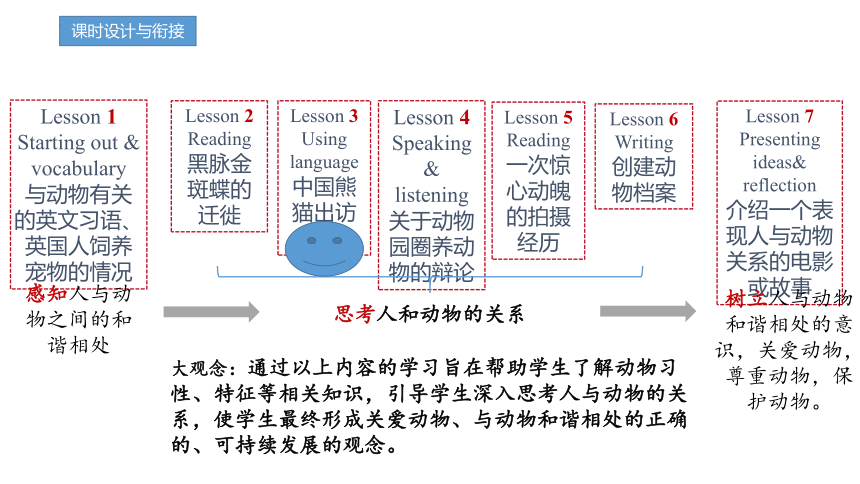

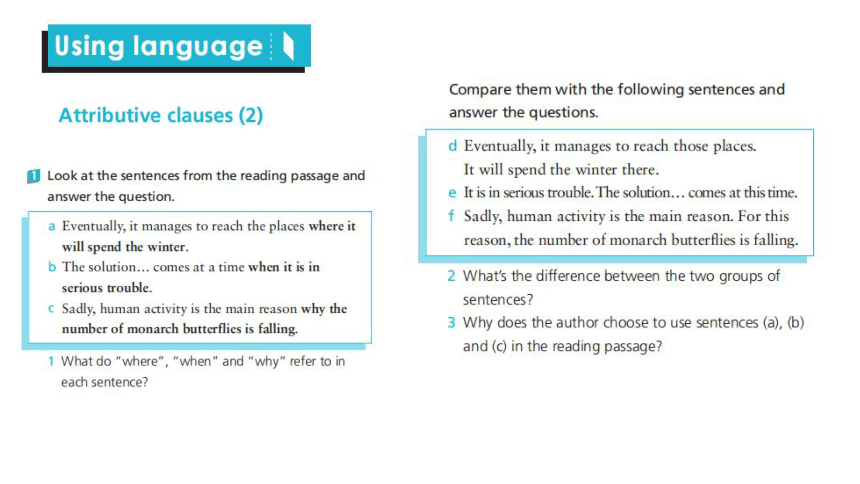
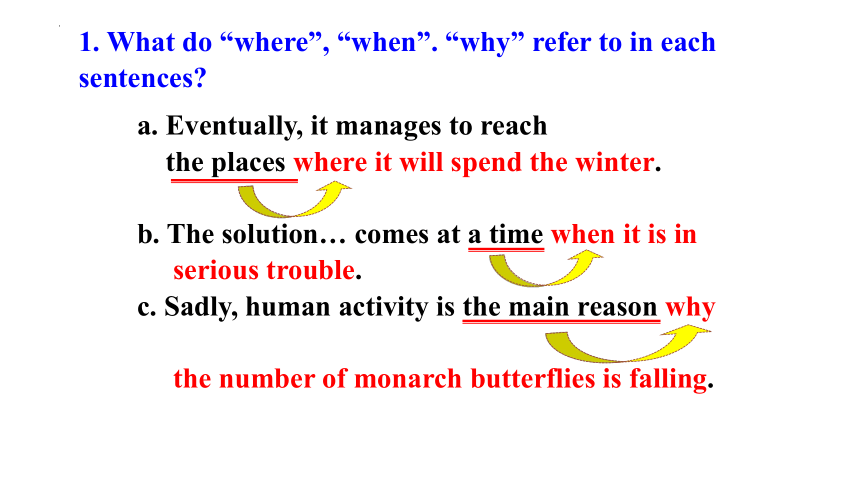
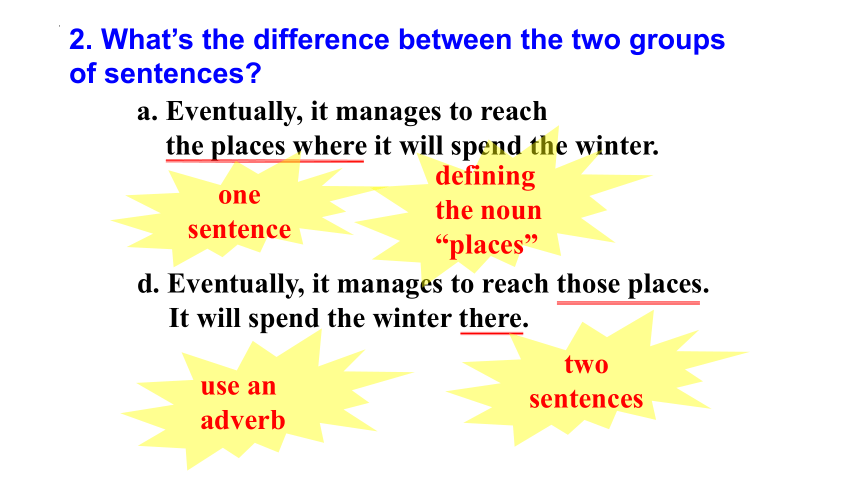
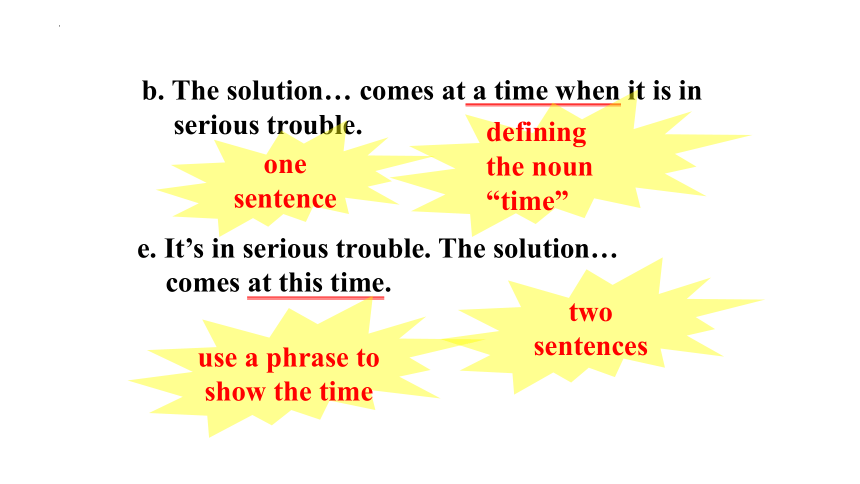
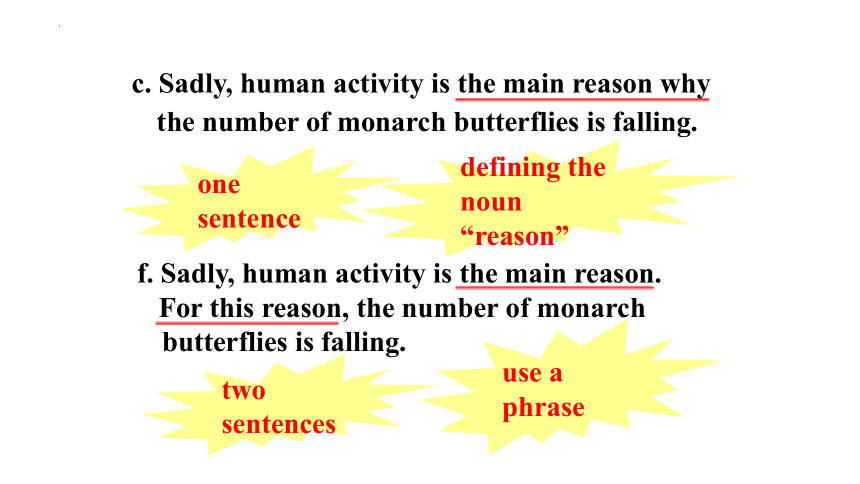
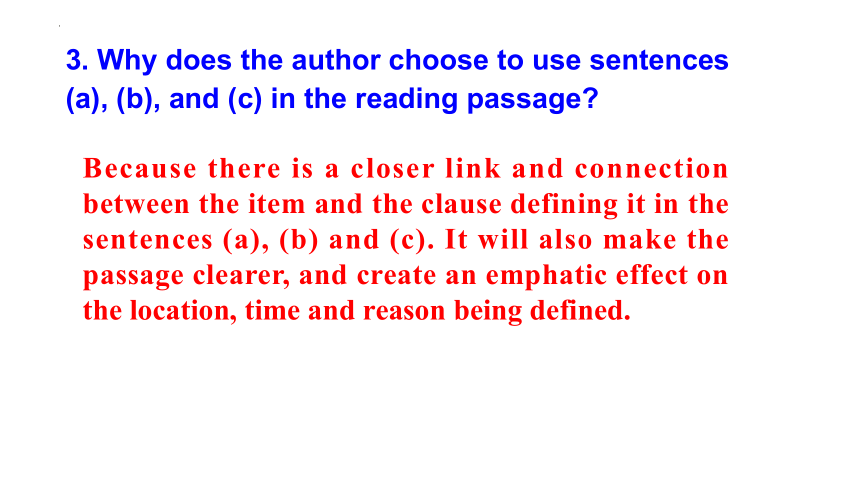
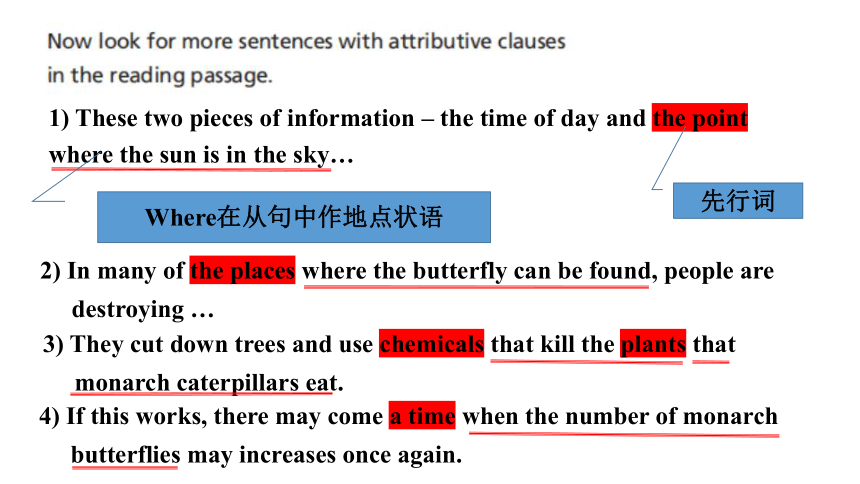
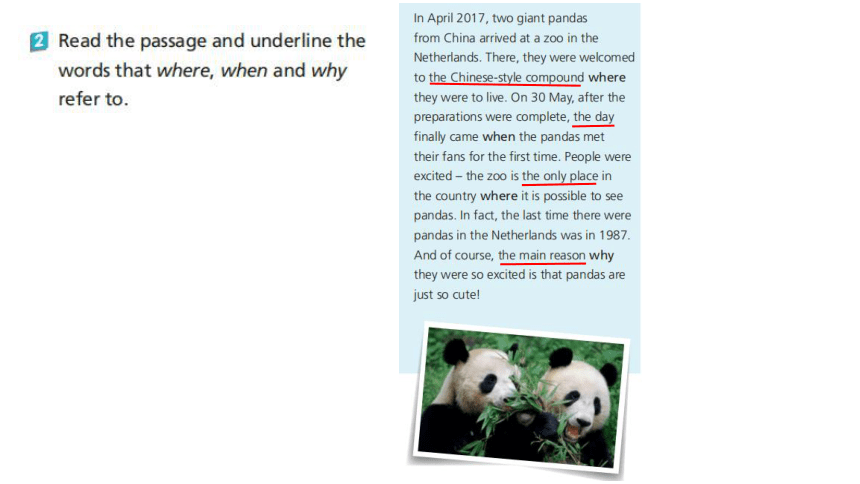
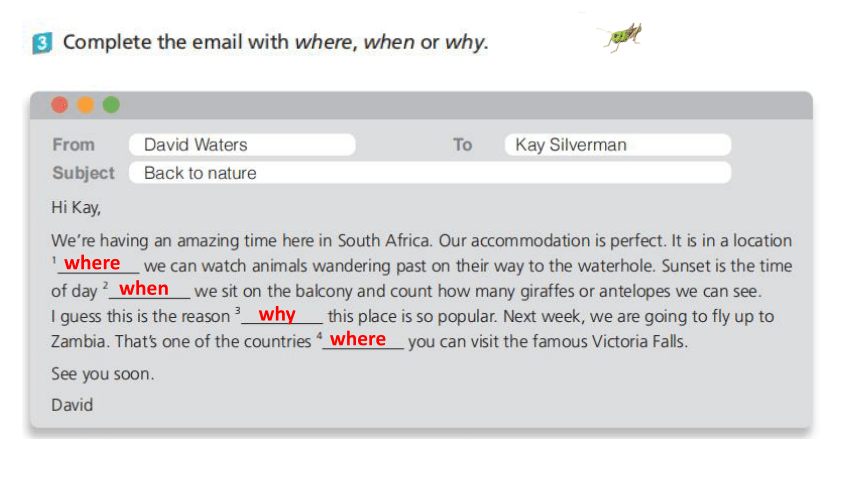
文档简介
(共31张PPT)
Lesson 1
Starting out & vocabulary
与动物有关的英文习语、英国人饲养宠物的情况
Lesson 2
Reading
黑脉金斑蝶的迁徙
Lesson 3
Using language
中国熊猫出访荷兰
Lesson 4
Speaking& listening
关于动物园圈养动物的辩论
Lesson 5
Reading
一次惊心动魄的拍摄经历
Lesson 6
Writing
创建动物档案
Lesson 7
Presenting ideas& reflection
介绍一个表现人与动物关系的电影或故事
课时设计与衔接
树立人与动物和谐相处的意识,关爱动物,尊重动物,保护动物。
大观念:通过以上内容的学习旨在帮助学生了解动物习性、特征等相关知识,引导学生深入思考人与动物的关系,使学生最终形成关爱动物、与动物和谐相处的正确的、可持续发展的观念。
思考人和动物的关系
感知人与动物之间的和谐相处
By the end of this class, you will be able to:
1. summarize the usages of “when, where, why” introducing attributive clauses;
2. use attributive clauses introduced by “when, where, why” in the situation given;
a. Eventually, it manages to reach
the places where it will spend the winter.
b. The solution… comes at a time when it is in serious trouble.
c. Sadly, human activity is the main reason why
the number of monarch butterflies is falling.
1. What do “where”, “when”. “why” refer to in each sentences
2. What’s the difference between the two groups of sentences
a. Eventually, it manages to reach
the places where it will spend the winter.
d. Eventually, it manages to reach those places. It will spend the winter there.
one sentence
two sentences
defining the noun “places”
use an adverb
b. The solution… comes at a time when it is in serious trouble.
e. It’s in serious trouble. The solution…
comes at this time.
one sentence
two sentences
defining the noun “time”
use a phrase to show the time
c. Sadly, human activity is the main reason why the number of monarch butterflies is falling.
f. Sadly, human activity is the main reason.
For this reason, the number of monarch butterflies is falling.
one sentence
two sentences
use a phrase
defining the noun “reason”
3. Why does the author choose to use sentences (a), (b), and (c) in the reading passage
Because there is a closer link and connection between the item and the clause defining it in the sentences (a), (b) and (c). It will also make the passage clearer, and create an emphatic effect on the location, time and reason being defined.
1) These two pieces of information – the time of day and the point where the sun is in the sky…
先行词
Where在从句中作地点状语
2) In many of the places where the butterfly can be found, people are destroying …
3) They cut down trees and use chemicals that kill the plants that monarch caterpillars eat.
4) If this works, there may come a time when the number of monarch butterflies may increases once again.
where
when
why
where
关系副词引导的定语从句
关系副词 先行词 功能
when 表示时间的名词 时间状语
where 表示地点的名词 地点状语
why reason 原因状语
1. 关系副词when引导定语从句时, 先行词应是表示时间的名词, 关系词在从句中作时间状语。
*You know these last few months when we’ve been expecting it to warm up a little bit
你知道最近这几个月我们一直盼望天气能暖和一些吗
*There comes a time when children need to know more than the basic facts of life. 儿童到了一定的时期需要了解的就不仅仅是最基本的生活知识了。
2. 关系副词where引导定语从句时, 先行词应是表示地点或抽象地点的名词, 关系词在从句中作地点状语。
*I want to work in a company where I can display my ability, and I hope to have an opportunity to develop my abilities.
我想在能展示我的能力的公司里工作, 并且我希望有机会使我的能力得到发展。
*Bamboo grows best in places where it is warm and where it rains often.
温暖而多雨的地方最适合竹子生长。
3. 关系副词why引导定语从句时, 先行词常常为reason, 关系词在从句中作原因状语。
*The reason why one is fat is partly caused by overeating. 造成肥胖的部分原因是饮食过多。
*I don’t know the reason why you were absent from the meeting. 我不知道你为什么缺席会议。
用适当的关系副词填空
(1)He lived in a time _____the blind couldn’t get much education.
(2)Can you tell me the company ______she works
(3)This is the reason ____the word belated was invented.
(4)Nowadays people are more concerned about the environment ______they live.
(5)The film brought the hours back to me _____I was taken good care of in that
faraway village.
when
where
why
where
when
注意事项:
1. 表示时间、地点及原因的名词作先行词时, 定语从句可用关系代词引导, 也可用关系副词引导。若先行词在定语从句中作状语时, 应用关系副词; 若先行词在定语从句中作主语或宾语时, 则应用关系代词。
*The custom dates from the days when women wore longer skirts.
这种习惯始于妇女穿较长裙子的时期。(when在从句中作状语)
*The music calls up the happy days which/that they spent together in their youth.
音乐使他们想起青年时代一起度过的快乐日子。(which/that作spent的宾语)
*The reason why we want to come to this store is that we really want this kind of phone.
我们想来这家店的原因是我们真的很想要这种手机。(why在从句中作状语)
*This is the reason that/which he explained to me for his not attending the meeting.
这就是他向我解释的不参加会议的原因。(定语从句中缺少宾语, 所以用that/which引导从句, 不用why)
2. 表示抽象地点的名词point, scene, situation, condition, case, stage, etc.其后面的定语从句常用where引导。
*The players must reach a point where they can be better prepared and carry the team forwards.
球员们必须达到一个水准, 那就是能够更好地备战、推动球队向前迈进。
*He has reached the stage where he thinks he can get over any problem in learning English.
他已经达到自认为可以克服英语学习中的一切困难的阶段。
用适当的关系词填空
(1)They are collecting information in preparation for the day _____the two sides sit
down and talk.
(2)I’ll never forget the day __________I spent with my cousins in the mountains.
(3)The reason __________he explained at the meeting was not reasonable.
(4)What you really need to do is figure out the reason ____you fail the exam.
(5)You’d better come up closer to the stage ______everyone can see you.
when
which/that
that/which
why
where
Ⅰ. 单句语法填空
1. (2019·天津高考)Their child is at the stage ______she can say individual words
but not full sentences.
2. (2019·江苏高考)We have entered into an age _____dreams have the best chance
of coming true.
3. Self-driving is an area ______China and the rest of the world are on the same
starting line.
4. The ring was spread over the garden, ______it remained until the carrot’s leafy
top accidentally sprouted(长出) through it.
where
when
where
where
5. The reason ______she gave is unbelievable.
6. We will put off the picnic in the park until next week, _____the weather may be
better.
7. Opposite is St. Paul’s Church, ______you can hear some lovely music.
8. The boss of the company is trying to create an easy atmosphere ______his
employees enjoy their work.
9. As the smallest child of his family, Alex is always longing for the time _____he
should be able to be independent.
10. The photo reminded me of the days __________we spent together in the summer
camp.
which
when
where
where
when
that/which
Ⅱ. 完成句子
1. She told the reporter that she had to survive on little food during the days _____
_____________. 她告诉记者她在被埋的日子里只能依靠很少的食物生存。
2. I have come to explain the reason _____________________________________
to you.
我是来向你解释我缺席你生日派对的原因。
3. There was a time _______________________________and disliked to speak
English.
有一段时间, 我厌倦学英语并且不喜欢说英语。
when
she was buried
why I was absent from your birthday party
when I was tired of learning English
用由关系副词引导的定语从句合并下列句子
1. I’ll never forget the moment. I first met Tom then.
→____________________________________________
2. Give me one good reason. I should help you for the reason.
→__________________________________________
3. Is this the classroom The old worker is going to give us a report in the classroom.
→_____________________________________________________________
I’ll never forget the moment when I first met Tom.
Give me one good reason why I should help you.
Is this the classroom where the old worker is going to give us a report
4. Gone are the days. Farmers lived in the poor houses in those days.
→__________________________________________________
5. Cheating is most likely in situations. The chances of getting caught are low in this
situation.
→_________________________________________________________________
_____
6. Can you tell me the reason You sold your new car for the reason.
→________________________________________________
Gone are the days when farmers lived in the poor houses.
Cheating is most likely in situations where the chances of getting caught are
low.
Can you tell me the reason why you sold your new car
7. What I can never forget is the night. We took a walk in the park at that night.
→_____________________________________________________________
8. Many countries are now setting up national parks. Animals and plants can be
protected in the national parks.
→_________________________________________________________________
_______________
What I can never forget is the night when we took a walk in the park.
Many countries are now setting up national parks where animals and plants
can be protected.
When we use which/that to lead an attributive clause, which/that is used as subject or object in the clause.
If we use where, when or why to lead an attributive clause, where, when or why is used as an adverbial in the clause.
Conclusion
【主题应用】
用定语从句简要介绍你对于动物园的观点。
1. 动物园是人们了解动物的好地方。(where)
2. 有的人认为动物园能帮助保护动物。他们认为有时动物不能自我保护。(when)
3. 但是另外一些人认为这并不是一个好办法, 因为动物园提供的环境并不是动物需要的自然环境。(why)
4. 我认为动物还是生活在大自然中更好。
__________________________________________________________________
____________________________________________________________________
_______________________________________________________________________
____________________________________________________________________
_________________________________________________________________
_______________________________________________
Zoos are good places where people can know about the animals. Some people
think that zoos can help to protect animals. They think there must be some time
when the animals can’t protect themselves. However, other people don’t think it is
a good idea. The reason why they think zoos do no good to animal protection is
that the environment in zoos is different from the natural one. As far as I’m
concerned, it is better for the animals to live in nature.
Write a passage about the experience between you and the animals, and use some attributive clauses in your passage.
Lesson 1
Starting out & vocabulary
与动物有关的英文习语、英国人饲养宠物的情况
Lesson 2
Reading
黑脉金斑蝶的迁徙
Lesson 3
Using language
中国熊猫出访荷兰
Lesson 4
Speaking& listening
关于动物园圈养动物的辩论
Lesson 5
Reading
一次惊心动魄的拍摄经历
Lesson 6
Writing
创建动物档案
Lesson 7
Presenting ideas& reflection
介绍一个表现人与动物关系的电影或故事
课时设计与衔接
树立人与动物和谐相处的意识,关爱动物,尊重动物,保护动物。
大观念:通过以上内容的学习旨在帮助学生了解动物习性、特征等相关知识,引导学生深入思考人与动物的关系,使学生最终形成关爱动物、与动物和谐相处的正确的、可持续发展的观念。
思考人和动物的关系
感知人与动物之间的和谐相处
By the end of this class, you will be able to:
1. summarize the usages of “when, where, why” introducing attributive clauses;
2. use attributive clauses introduced by “when, where, why” in the situation given;
a. Eventually, it manages to reach
the places where it will spend the winter.
b. The solution… comes at a time when it is in serious trouble.
c. Sadly, human activity is the main reason why
the number of monarch butterflies is falling.
1. What do “where”, “when”. “why” refer to in each sentences
2. What’s the difference between the two groups of sentences
a. Eventually, it manages to reach
the places where it will spend the winter.
d. Eventually, it manages to reach those places. It will spend the winter there.
one sentence
two sentences
defining the noun “places”
use an adverb
b. The solution… comes at a time when it is in serious trouble.
e. It’s in serious trouble. The solution…
comes at this time.
one sentence
two sentences
defining the noun “time”
use a phrase to show the time
c. Sadly, human activity is the main reason why the number of monarch butterflies is falling.
f. Sadly, human activity is the main reason.
For this reason, the number of monarch butterflies is falling.
one sentence
two sentences
use a phrase
defining the noun “reason”
3. Why does the author choose to use sentences (a), (b), and (c) in the reading passage
Because there is a closer link and connection between the item and the clause defining it in the sentences (a), (b) and (c). It will also make the passage clearer, and create an emphatic effect on the location, time and reason being defined.
1) These two pieces of information – the time of day and the point where the sun is in the sky…
先行词
Where在从句中作地点状语
2) In many of the places where the butterfly can be found, people are destroying …
3) They cut down trees and use chemicals that kill the plants that monarch caterpillars eat.
4) If this works, there may come a time when the number of monarch butterflies may increases once again.
where
when
why
where
关系副词引导的定语从句
关系副词 先行词 功能
when 表示时间的名词 时间状语
where 表示地点的名词 地点状语
why reason 原因状语
1. 关系副词when引导定语从句时, 先行词应是表示时间的名词, 关系词在从句中作时间状语。
*You know these last few months when we’ve been expecting it to warm up a little bit
你知道最近这几个月我们一直盼望天气能暖和一些吗
*There comes a time when children need to know more than the basic facts of life. 儿童到了一定的时期需要了解的就不仅仅是最基本的生活知识了。
2. 关系副词where引导定语从句时, 先行词应是表示地点或抽象地点的名词, 关系词在从句中作地点状语。
*I want to work in a company where I can display my ability, and I hope to have an opportunity to develop my abilities.
我想在能展示我的能力的公司里工作, 并且我希望有机会使我的能力得到发展。
*Bamboo grows best in places where it is warm and where it rains often.
温暖而多雨的地方最适合竹子生长。
3. 关系副词why引导定语从句时, 先行词常常为reason, 关系词在从句中作原因状语。
*The reason why one is fat is partly caused by overeating. 造成肥胖的部分原因是饮食过多。
*I don’t know the reason why you were absent from the meeting. 我不知道你为什么缺席会议。
用适当的关系副词填空
(1)He lived in a time _____the blind couldn’t get much education.
(2)Can you tell me the company ______she works
(3)This is the reason ____the word belated was invented.
(4)Nowadays people are more concerned about the environment ______they live.
(5)The film brought the hours back to me _____I was taken good care of in that
faraway village.
when
where
why
where
when
注意事项:
1. 表示时间、地点及原因的名词作先行词时, 定语从句可用关系代词引导, 也可用关系副词引导。若先行词在定语从句中作状语时, 应用关系副词; 若先行词在定语从句中作主语或宾语时, 则应用关系代词。
*The custom dates from the days when women wore longer skirts.
这种习惯始于妇女穿较长裙子的时期。(when在从句中作状语)
*The music calls up the happy days which/that they spent together in their youth.
音乐使他们想起青年时代一起度过的快乐日子。(which/that作spent的宾语)
*The reason why we want to come to this store is that we really want this kind of phone.
我们想来这家店的原因是我们真的很想要这种手机。(why在从句中作状语)
*This is the reason that/which he explained to me for his not attending the meeting.
这就是他向我解释的不参加会议的原因。(定语从句中缺少宾语, 所以用that/which引导从句, 不用why)
2. 表示抽象地点的名词point, scene, situation, condition, case, stage, etc.其后面的定语从句常用where引导。
*The players must reach a point where they can be better prepared and carry the team forwards.
球员们必须达到一个水准, 那就是能够更好地备战、推动球队向前迈进。
*He has reached the stage where he thinks he can get over any problem in learning English.
他已经达到自认为可以克服英语学习中的一切困难的阶段。
用适当的关系词填空
(1)They are collecting information in preparation for the day _____the two sides sit
down and talk.
(2)I’ll never forget the day __________I spent with my cousins in the mountains.
(3)The reason __________he explained at the meeting was not reasonable.
(4)What you really need to do is figure out the reason ____you fail the exam.
(5)You’d better come up closer to the stage ______everyone can see you.
when
which/that
that/which
why
where
Ⅰ. 单句语法填空
1. (2019·天津高考)Their child is at the stage ______she can say individual words
but not full sentences.
2. (2019·江苏高考)We have entered into an age _____dreams have the best chance
of coming true.
3. Self-driving is an area ______China and the rest of the world are on the same
starting line.
4. The ring was spread over the garden, ______it remained until the carrot’s leafy
top accidentally sprouted(长出) through it.
where
when
where
where
5. The reason ______she gave is unbelievable.
6. We will put off the picnic in the park until next week, _____the weather may be
better.
7. Opposite is St. Paul’s Church, ______you can hear some lovely music.
8. The boss of the company is trying to create an easy atmosphere ______his
employees enjoy their work.
9. As the smallest child of his family, Alex is always longing for the time _____he
should be able to be independent.
10. The photo reminded me of the days __________we spent together in the summer
camp.
which
when
where
where
when
that/which
Ⅱ. 完成句子
1. She told the reporter that she had to survive on little food during the days _____
_____________. 她告诉记者她在被埋的日子里只能依靠很少的食物生存。
2. I have come to explain the reason _____________________________________
to you.
我是来向你解释我缺席你生日派对的原因。
3. There was a time _______________________________and disliked to speak
English.
有一段时间, 我厌倦学英语并且不喜欢说英语。
when
she was buried
why I was absent from your birthday party
when I was tired of learning English
用由关系副词引导的定语从句合并下列句子
1. I’ll never forget the moment. I first met Tom then.
→____________________________________________
2. Give me one good reason. I should help you for the reason.
→__________________________________________
3. Is this the classroom The old worker is going to give us a report in the classroom.
→_____________________________________________________________
I’ll never forget the moment when I first met Tom.
Give me one good reason why I should help you.
Is this the classroom where the old worker is going to give us a report
4. Gone are the days. Farmers lived in the poor houses in those days.
→__________________________________________________
5. Cheating is most likely in situations. The chances of getting caught are low in this
situation.
→_________________________________________________________________
_____
6. Can you tell me the reason You sold your new car for the reason.
→________________________________________________
Gone are the days when farmers lived in the poor houses.
Cheating is most likely in situations where the chances of getting caught are
low.
Can you tell me the reason why you sold your new car
7. What I can never forget is the night. We took a walk in the park at that night.
→_____________________________________________________________
8. Many countries are now setting up national parks. Animals and plants can be
protected in the national parks.
→_________________________________________________________________
_______________
What I can never forget is the night when we took a walk in the park.
Many countries are now setting up national parks where animals and plants
can be protected.
When we use which/that to lead an attributive clause, which/that is used as subject or object in the clause.
If we use where, when or why to lead an attributive clause, where, when or why is used as an adverbial in the clause.
Conclusion
【主题应用】
用定语从句简要介绍你对于动物园的观点。
1. 动物园是人们了解动物的好地方。(where)
2. 有的人认为动物园能帮助保护动物。他们认为有时动物不能自我保护。(when)
3. 但是另外一些人认为这并不是一个好办法, 因为动物园提供的环境并不是动物需要的自然环境。(why)
4. 我认为动物还是生活在大自然中更好。
__________________________________________________________________
____________________________________________________________________
_______________________________________________________________________
____________________________________________________________________
_________________________________________________________________
_______________________________________________
Zoos are good places where people can know about the animals. Some people
think that zoos can help to protect animals. They think there must be some time
when the animals can’t protect themselves. However, other people don’t think it is
a good idea. The reason why they think zoos do no good to animal protection is
that the environment in zoos is different from the natural one. As far as I’m
concerned, it is better for the animals to live in nature.
Write a passage about the experience between you and the animals, and use some attributive clauses in your passage.
